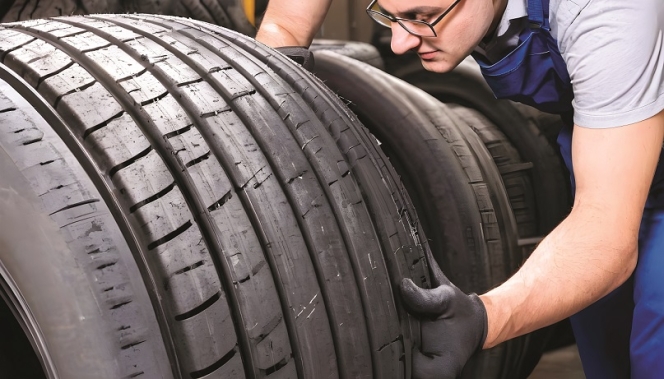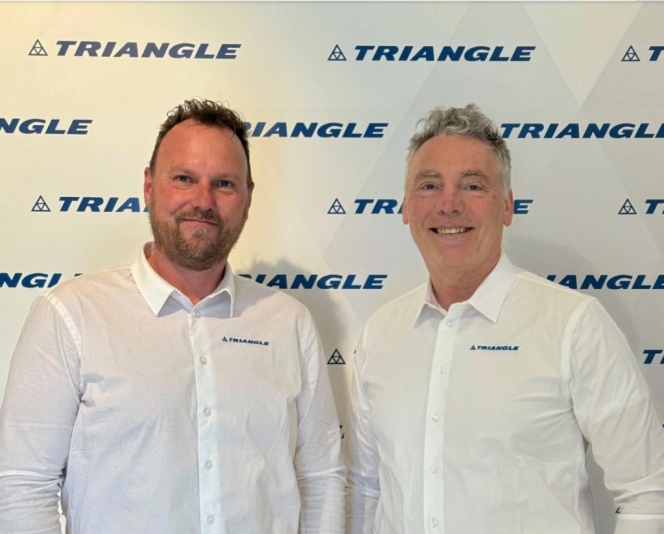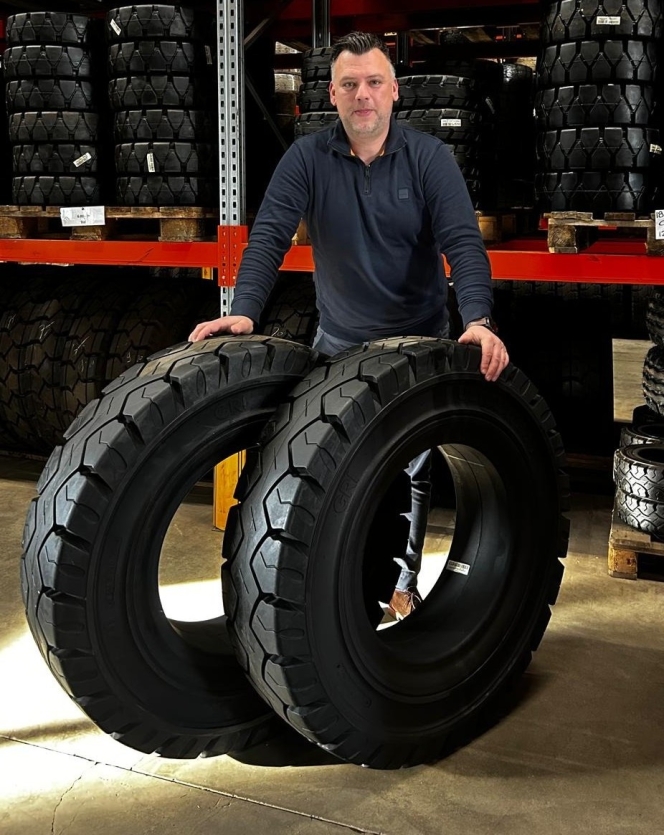70 Percent Truck Tyres In India Are Retreaded Once: ICRA
- By Gaurav Nandi
- January 10, 2025

India’s tyre retreading market is estimated to be an INR 60 billion industry with retreading mostly happening on commercial vehicle tyres. The organised sector is slated to grow between 7-9 percent (CAGR) over the next three years. The retreading industry in India dates back decades, primarily focusing on commercial vehicle tyres. Over the decades, it has evolved with advancements in technology and regulatory frameworks. Government initiatives promoting sustainability and waste tyre management have further spurred growth, establishing retreading as a key component of the tyre market.
A recent media report stated that the organised tyre retreading market in India observed muted growth in the last five years. Speaking to Tyre Trends¸ ICRA Assistant Vice President and Sector Head – Corporate Ratings Nithya Debbadi said, “The domestic tyre retreading market is estimated at over INR 60 billion. Tyre retreading is largely done in commercial vehicles, which account for 80 percent of the market. Trucks account for 60-65 percent, while buses account for the rest of 15-20 percent. Off-highway tyres (OHT) including tractors account for 12-15 percent, while passenger vehicles account for a negligible share.”
More than 70 percent of the truck tyres are retreaded at least once. While retreading is prominent even in the LCV segment, proportion of tyres retreaded is lower than in M&HCV. Increasing radialisation, improving road infrastructure and retreading technology and focus on sustainability is expected to increase the share of retreading in the truck and bus radial (TBR) segment, going forward. New tyre designs for electric vehicles also presents opportunities for the retreading industry.
Demand growth
Alluding to how the Indian government’s focus on waste tyre disposal and increasing radialisation in commercial vehicles has benefitted the TBR retreading market in India, she noted, “Indian government introduced Extended Producer Responsibility (EPR) guidelines for waste tyres management, which came into effect in July 2022. The guidelines lay down rules relating to utilisation and management of waste tyres by producers (manufacturers and importers), recyclers and retreaders. Producers or importers need to fulfil EPR obligations by purchasing EPR certificate from registered recyclers. However, EPR obligation of tyre which has been retreaded shall be deferred by one year.”
 “While the guidelines came into effect in FY2023, targets have been increasing progressively with the obligation increasing to 100 percent of tyre production in FY2025. Increasing focus on waste tyre management incentivises producers to focus on sustainability, which supports growth of retreading market. Compliance is achieved by purchasing EPR certificates from authorised recyclers or retreaders, thus developing tyre recycling infrastructure,” she added.
“While the guidelines came into effect in FY2023, targets have been increasing progressively with the obligation increasing to 100 percent of tyre production in FY2025. Increasing focus on waste tyre management incentivises producers to focus on sustainability, which supports growth of retreading market. Compliance is achieved by purchasing EPR certificates from authorised recyclers or retreaders, thus developing tyre recycling infrastructure,” she added.
In trucks and bus segment, share of radialisation is estimated to have increased from 48 percent in FY2019 to over 55 percent in FY2024. Radial tyres have stronger structure, which supports multiple rounds of retreading. Moreover, radial tyres are more suited for roads in better conditions, leading to higher range for a given duration. This leads to frequent need for retreading.
She also noted that owing to Covid-19 and its post-effects, the retreading industry saw a flattish growth (estimated CAGR of 1-3 percent) in the three years ending FY2023. However, with the government’s thrust towards disposal of waste tyres, anti-overloading measures and increasing radialisation in commercial vehicle tyre segment, the retreading market has been a key beneficiary witnessing better demand traction in FY2024.
ICRA expects the organised tyre retreaders to grow by 7-9 percent (CAGR) over the next three years. Key factors supporting the growth include focus on sustainable tyres, improving tyre and retreading technology, better road infrastructure, rising radialisation in CV segment etc.
Alluding to what impact is the growing demand for sustainability and cost efficiency having on the quality standards and innovation within the retreading industry, she noted, “Retreading results in significant cost saving as the cost of retreading is around 20-50 percent the cost of a new tyre because of reuse of casing. Treads account for close to one-third of a tyre’s total cost. Performance of a retreaded tyre also depends on the health of the original casing.”
She added, “Developments in tyre technology has resulted in stronger casings and overall tyre structure that supports multiple rounds of retreading. Enhanced re-manufacturing techniques and higher quality rubber compounds are improving the quality of retreaded tyres and supporting demand. With quality casing and superior retreading technology, a tyre can be retreaded two to three times before being replaced while maintaining 80 percent quality of the new one.
Impending challenges
The tyre retreading market in India is at a pivotal juncture driven by a confluence of regulatory support, technological advancements and a growing awareness of sustainability. While challenges remain in the form of market fragmentation, the potential for growth is significant.
Despite these positive trends, the TBR retreading market faces significant challenges. The Indian market remains highly fragmented with over 50 percent of players operating in the unorganised sector.
As the industry adapts to changing dynamics, the focus on quality and sustainability will play a crucial role in shaping its future trajectory. The next decade may see retreading not just as a viable alternative to new tyres but as an essential component of a more sustainable automotive ecosystem in India.
Triangle Tyre Appoints Federico Parmesan As European OTR Technical Manager
- By TT News
- March 04, 2026

Triangle Tyre has significantly strengthened its European off-the-road operations with the appointment of Federico Parmesan as the new European OTR Technical Manager, a position he assumed on 1 March 2026. This strategic appointment represents a key milestone in the company's ongoing efforts to enhance its technical capabilities and expand its market presence across the continent's specialised tyre sector.
Parmesan brings more than three decades of tyre industry experience to his new role, with particular expertise concentrated in OTR and earthmoving applications. His extensive background encompasses not only deep technical knowledge but also a comprehensive understanding of the challenges faced by dealers and end-users operating in demanding environments. This combination of technical proficiency and practical insight positions him to effectively bridge the gap between product development and real-world application requirements.
In his new capacity, Parmesan will work closely with Triangle's partner network throughout Europe, providing support for both aftermarket and original equipment segments. His responsibilities include strengthening the company's field application expertise and contributing directly to the continued development of the OTR product portfolio. These efforts aim to deliver enhanced value and service to partners across the region.
The appointment reflects Triangle's strategic priority of reinforcing its technical structure to support ambitious growth objectives in the European OTR segment. The company seeks not merely to consolidate its existing market share but to achieve sustainable expansion while elevating support levels for its partners. Parmesan's extensive experience, energetic approach and positive attitude are expected to prove invaluable assets as Triangle pursues these goals and strengthens its position within the competitive European market.
ATF Tyres Appoints Rajesh Vyas As Vice President Of Sales And Marketing
- By TT News
- March 03, 2026

ATF Tyres, one of India’s leading manufacturers of off-highway tyres, has announced the appointment of Rajesh Vyas as its new Vice President of Sales and Marketing. Vyas brings over 25 years of global experience to the role, having worked across diverse international markets to build high-performance sales teams and enhance distribution networks.
His professional background includes leadership roles in brand positioning and product portfolio expansion within competitive sectors. Prior to joining ATF, Vyas served as Vice President at Rubber King Tyre Group. He also held key positions at Balkrishna Industries Limited as Head of Mining Tyres for India and spent a decade at Apollo Tyres Ltd as Business Head for Off-Highway Tyres.
With the company working to expand its footprint in the agricultural, industrial and OTR segments worldwide, Vyas’s strategic leadership and commercial insight are expected to support ATF Tyres in delivering performance-driven solutions across multiple regions.
Continental Intros ‘Nod Of Confidence’ Ambassador To Enhance Tyre-Buying Experience
- By TT News
- March 03, 2026

Continental Tire has introduced a fresh and distinctive marketing figure known as the ‘Nod of Confidence’ ambassador to connect with drivers on a deeper level. This initiative is designed to encapsulate the precise moment a customer feels absolute certainty in their purchase decision, visually represented by a simple, affirming nod. It is a symbolic gesture that conveys the reassurance, trust and satisfaction associated with selecting a premium tyre brand.
For years, Continental has been regarded as the smart choice in the industry, a reputation built on a steadfast dedication to superior quality, advanced technology and dependable performance. The company consistently responds to market demands by engineering tyres that deliver exceptional comfort and peace of mind. Recognising that the process of buying tyres can often be complex and filled with uncertainty, this campaign targets the emotional journey of the consumer. It aims to capture that pivotal moment of clarity when a driver moves from questioning and comparing options to confidently confirming they have chosen the best solution for their vehicle and family.
This new ambassador is an extension of Continental's broader mission to simplify and enhance the tyre-buying experience. By blending cutting-edge tread innovations with customer-focused education and support, the brand continues to prioritise driver needs while reinforcing its leadership in the automotive industry.
Brian Beierwaltes, Head of Marketing US PLT, Continental Tire, said, “We understand that today’s consumers are looking for more than just a product, they’re looking for confidence. This creative idea brings our ‘Smart Choice in Tires’ philosophy to life in a simple, relatable way. That nod represents reassurance, expertise and the peace of mind that comes from selecting a brand that consistently delivers on performance, comfort and innovation.”
GRI Appoints Eldo Verhaagen To Lead Benelux Material Handling And Agriculture Operations
- By TT News
- March 03, 2026

GRI, a leading producer of speciality tyres from Sri Lanka, has named Eldo Verhaagen as its new Sales & Operations Director for Material Handling and Agriculture across the Benelux region. This strategic move underscores the company’s drive to enhance its regional footprint by reinforcing leadership, improving operational efficiency and strengthening relationships with local customers. Verhaagen’s arrival marks a continued push to expand GRI’s presence in both the material handling and agricultural sectors.
With extensive experience in the tyre and automotive fields, Verhaagen brings a proven background in guiding strategy, boosting commercial performance and refining operational processes. His familiarity with a broad range of tyre types – including those used in trucking, farming, construction and material handling – combined with a direct, customer-oriented working style, makes him well-suited to steer the region through its upcoming growth phase.

Verhaagen takes over from Herman Klumpenaar, whom GRI has thanked for his dedicated leadership and smooth handling of the leadership transition. The Benelux team is now set to collaborate closely with Verhaagen, aiming to sustain regional progress and ensure long-term, steady development.
Giorgio Gramegna, Director of Europe – Sales, Marketing and Distribution at GRI, said, “We thank Herman for his leadership and contribution over the years. We are pleased to welcome Eldo and are confident that his experience and market knowledge will further strengthen our presence and performance in the Benelux region.”







Comments (0)
ADD COMMENT